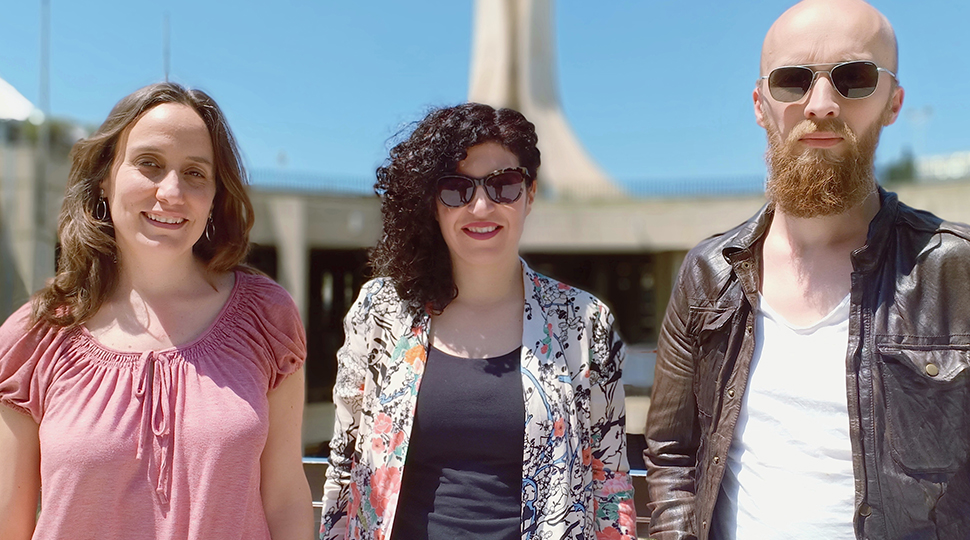Maya Youssef was desperate to play the qanun from the moment she first heard it on a taxi radio. The 78-string instrument is heard widely in the Middle East, including her homeland of Syria, but there are few well-known female players. Girls don’t play the qanun, explained the taxi driver. Undeterred, she did learn, graduating from the High Institute of Music and Dramatic Arts in Damascus in 2007 and later moving to London as part of the Arts Council’s exceptional talent scheme.
In May 2019, we invited Maya to perform at the twentieth edition of the European Cultural Festival in Algiers. Over the years, working with the British Council in Algeria, we’ve supported many artists to perform at the festival – including Zoe Rahman, Akala, Afrikan Boy, Yazz Ahmed and Hejira – but Maya, speaking to the audience in Arabic, had a unique take on the experience.
‘The rules of engagement at a concert are completely different [between UK and Arab audiences]’ she explains. ‘If you are sitting down and completely quiet [at a concert] then the [Arab] musician will think they’re playing horribly! So it was good to play in front of an interactive Arab audience again.’
Maya writes her own music based on Syrian musical traditions but hugely informed by her UK surroundings, collaborating with Western musicians, producers and co-writers. This perspective also informs the sense of humour on her track ‘Hi-Jazz’ which uses the melodic intervals of the maqam hijaz – the scale that a stereotypical Western audience might associate with music from the Middle East – to tease with the Western idea of the ‘exotic East’. The audience in Algiers enjoyed being in on the joke.
‘I love telling stories,’ says Maya, launching into a story. ‘I want to share [with the audience] exactly what spark led to me writing a piece of music. Some of my pieces are very personal. Some of them are joyful, some of them are heartbreaking. Some of the pieces are related to things happening in my homeland. When it comes to “Syrian Dreams” … this is the first piece of music I wrote after hearing the news of the little girl who died in her bedroom [in Damascus]. I want that deeper level of connection – taking the audience on a journey with me on a human and a musical level.’
Maya was able to connect on a human and musical level with a group of young female qanun players before her show in Algiers. These young women had travelled from cities around the country to spend time with Maya learning more about the qanun in a specially organised workshop.
‘I was so happy I accepted,’ beams Maya. ‘These women are learning the qanun from YouTube but have never had a lesson in their lives, so they’re just hoping they are doing everything the right way with their posture and technique.’
‘There was a fantastically talented young woman – 18 or 19 years old – but I was told her Dad didn’t want her to come because he was concerned about her travelling on her own. She finally turned up at the last minute and was practically in tears, she was that pleased she’d made it, and came to the gig and the sweetest thing was she said the music had inspired her to write a poem all about forgiveness.’
Without any formal training, these young women are finding their own blend of inspiration. ‘One told me her passion is jazz and qanun – I said “great!”’
Amazing Qanun Workshop with Maya Youssef and young female Musicians live from Algiers #womeninmusic #britishcouncil @SandraHamrouni @HayatMesse @Mayaqanun @LeahZakss @BritishArts pic.twitter.com/lscV5Lssul
— Imene Bouchair (@Sol_La_Imene) May 28, 2019
In a country where there are so few known female qanun players, Maya’s role was as much to give the women confidence to express themselves as it was to guide them with their instrumental technique. She is still in touch with them, affectionately calling them her qanunistas, encouraging them to carry on playing as much as they can to get better but, like musicians the world over, ‘they’re trying to find time to dedicate to their passion’ while also managing their day to day lives.
‘I was so touched by how hungry and eager they were. We sat for more than three hours but we barely scratched the surface. I’m asking them to improvise, to be themselves – we could really continue that. There’s no end to that. You can always go deeper and deeper and deeper and deeper.’
Maya is now looking at ways to carry on this work with the young women she met in Algiers. As a world-renowned qanun player from the Middle East, and recipient of PRS Foundation’s Women Make Music grant this year, there is perhaps no better mentor and her enthusiasm and energy is undeniably infectious. Not only she is in the process of writing her next album – a follow up to 2017’s Syrian Dreams, produced by Jerry Boys (Buena Vista Social Club, R.E.M.) and championed by Joe Boyd (Pink Floyd, Nick Drake, Vashti Bunyan) – she is also gigging, mentoring female musicians in the UK, working on an online programme to help mentor even more and studying for a PhD on how music can help refugee children. What would the taxi driver would say now?
Maya Youssef is playing several UK and European dates between now and the end of the year


